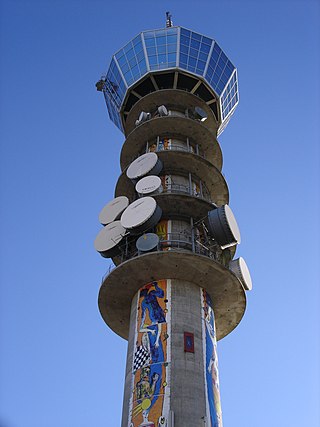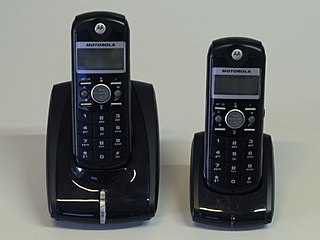The ISM radio bands are portions of the radio spectrum reserved internationally for industrial, scientific, and medical (ISM) purposes, excluding applications in telecommunications. Examples of applications for the use of radio frequency (RF) energy in these bands include RF heating, microwave ovens, and medical diathermy machines. The powerful emissions of these devices can create electromagnetic interference and disrupt radio communication using the same frequency, so these devices are limited to certain bands of frequencies. In general, communications equipment operating in ISM bands must tolerate any interference generated by ISM applications, and users have no regulatory protection from ISM device operation in these bands.

Electromagnetic compatibility (EMC) is the ability of electrical equipment and systems to function acceptably in their electromagnetic environment, by limiting the unintentional generation, propagation and reception of electromagnetic energy which may cause unwanted effects such as electromagnetic interference (EMI) or even physical damage to operational equipment. The goal of EMC is the correct operation of different equipment in a common electromagnetic environment. It is also the name given to the associated branch of electrical engineering.

In telecommunications, especially radio communication, spread spectrum are techniques by which a signal generated with a particular bandwidth is deliberately spread in the frequency domain over a wider frequency band. Spread-spectrum techniques are used for the establishment of secure communications, increasing resistance to natural interference, noise, and jamming, to prevent detection, to limit power flux density, and to enable multiple-access communications.

An RF modulator is an electronic device used to convert signals from devices such as media players, VCRs and game consoles to a format that can be handled by a device designed to receive a modulated RF input, such as a radio or television receiver. Its input is a baseband signal, which is used to modulate a radio frequency source.

A Faraday cage or Faraday shield is an enclosure used to block some electromagnetic fields. A Faraday shield may be formed by a continuous covering of conductive material, or in the case of a Faraday cage, by a mesh of such materials. Faraday cages are named after scientist Michael Faraday, who first constructed one in 1836.

Radio broadcasting is the broadcasting of audio (sound), sometimes with related metadata, by radio waves to radio receivers belonging to a public audience. In terrestrial radio broadcasting the radio waves are broadcast by a land-based radio station, while in satellite radio the radio waves are broadcast by a satellite in Earth orbit. To receive the content the listener must have a broadcast radio receiver (radio). Stations are often affiliated with a radio network that provides content in a common radio format, either in broadcast syndication or simulcast, or both. The encoding of a radio broadcast depends on whether it uses an analog or digital signal. Analog radio broadcasts use one of two types of radio wave modulation: amplitude modulation for AM radio, or frequency modulation for FM radio. Newer, digital radio stations transmit in several different digital audio standards, such as DAB, HD radio, or DRM.

The FM broadcast band is a range of radio frequencies used for FM broadcasting by radio stations. The range of frequencies used differs between different parts of the world. In Europe and Africa and in Australia and New Zealand, it spans from 87.5 to 108 megahertz (MHz) - also known as VHF Band II - while in the Americas it ranges from 88 to 108 MHz. The FM broadcast band in Japan uses 76 to 95 MHz, and in Brazil, 76 to 108 MHz. The International Radio and Television Organisation (OIRT) band in Eastern Europe is from 65.9 to 74.0 MHz, although these countries now primarily use the 87.5 to 108 MHz band, as in the case of Russia. Some other countries have already discontinued the OIRT band and have changed to the 87.5 to 108 MHz band.

A cordless telephone or portable telephone has a portable telephone handset that connects by radio to a base station connected to the public telephone network. The operational range is limited, usually to the same building or within some short distance from the base station.

Electromagnetic interference (EMI), also called radio-frequency interference (RFI) when in the radio frequency spectrum, is a disturbance generated by an external source that affects an electrical circuit by electromagnetic induction, electrostatic coupling, or conduction. The disturbance may degrade the performance of the circuit or even stop it from functioning. In the case of a data path, these effects can range from an increase in error rate to a total loss of the data. Both human-made and natural sources generate changing electrical currents and voltages that can cause EMI: ignition systems, cellular network of mobile phones, lightning, solar flares, and auroras. EMI frequently affects AM radios. It can also affect mobile phones, FM radios, and televisions, as well as observations for radio astronomy and atmospheric science.

A spy ship or reconnaissance vessel is a dedicated ship intended to gather intelligence, usually by means of sophisticated electronic eavesdropping. In a wider sense, any ship intended to gather information could be considered a spy ship.
802.11j-2004 or 802.11j is an amendment to the IEEE 802.11 standard designed specially for Japanese market. It allows wireless LAN operation in the 4.9–5.0 GHz band to conform to the Japanese rules for radio operation for indoor, outdoor and mobile applications. The amendment has been incorporated into the published IEEE 802.11-2007 standard.
The Comité International Spécial des Perturbations Radioélectriques was founded in 1934 to set standards for controlling electromagnetic interference in electrical and electronic devices and is a part of the International Electrotechnical Commission (IEC).
The Provincial Competitiveness Index (PCI) in Vietnam is designed to assess and rank the performance, capacity and willingness of provincial governments to develop business-friendly regulatory environments for private sector development. The fourth iteration, PCI 2008, once again validates that economic governance does matter. At each level of initial conditions, better-governed provinces are able to not only use their endowments more efficiently but also influence business performance and income in subsequent years.

The FCC logo or the FCC mark is a voluntary mark employed on electronic products manufactured or sold in the United States which indicates that the electromagnetic radiation from the device is below the limits specified by the Federal Communications Commission and the manufacturer has followed the requirements of the Supplier's Declaration of Conformity authorization procedures. The FCC label is found even on products sold outside the US territory, because they are either products manufactured in the US and had been exported, or they are also sold in the US. This makes the FCC label recognizable worldwide even to people to whom the name of the agency is not familiar.
The 800 MHz frequency band is a portion of the electromagnetic spectrum, or frequency band, that encompasses 790–862 MHz.
Vadodara Innovation Council (VIC) is the first city-based Innovation Council in India, associated with the National Innovation Council. Vadodara Innovation Council started functioning in May-2011 under the leadership of technocrat Dr. Madhu Mehta. VIC, a non-profit company, has the stated goal "To build Innovative, Curious and Questioning Society in Vadodara region".
An electromagnetic pulse (EMP), also referred to as a transient electromagnetic disturbance (TED), is a brief burst of electromagnetic energy. The origin of an EMP can be natural or artificial, and can occur as an electromagnetic field, as an electric field, as a magnetic field, or as a conducted electric current. The electromagnetic interference caused by an EMP can disrupt communications and damage electronic equipment. An EMP such as a lightning strike can physically damage objects such as buildings and aircraft. The management of EMP effects is a branch of electromagnetic compatibility (EMC) engineering.
Vietnam Chamber of Commerce and Industry (VCCI) is a national organization which assembles and represents business community, employers and business associations of all economic sectors in Vietnam. The promotion of trade and business relations with enterprises abroad is one of its main functions. VCCI is an independent, non-governmental, non-profit organization having the status of a legal entity and operating with financial autonomy. N.B. The email links on their site do not work.










